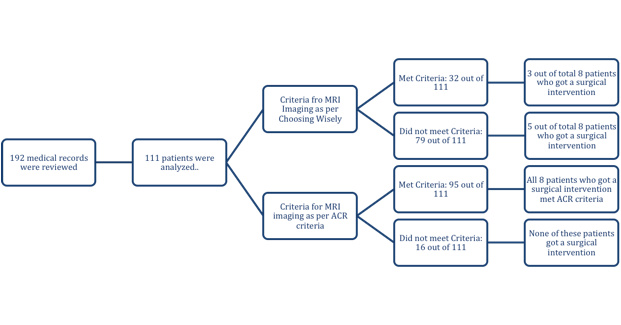Session Information
Session Type: ACR Concurrent Abstract Session
Session Time: 2:30PM-4:00PM
Background/Purpose: Low back pain is a highly prevalent problem affecting approximately 70-85% of Americans in their lifetime (1). American College of Physicians (ACP) has recommended in the Choosing Wisely Campaign by American Board of Internal Medicine (ABIM) in 2012, to avoid getting any radiological imaging in a patient complaining of non-specific lower back pain that cannot be attributed to a specific disease or spinal abnormality (2). The aim of this research is to compare the recommendations of the Choosing Wisely Campaign with American College of Radiology (ACR) in terms of evaluation of low back pain with MRI imaging.
Methods: This is a retrospective cross sectional study of all patients who had MRI of the lumbar spine from January 2013 to April 2015 for evaluation of low back pain. IRB approval was obtained. Indications as defined by the Choosing Wisely Initiative for MRI imaging in a patient with low back pain include history of fever, cancer, intravenous drug abuse, osteoporosis, focal neurological deficits or bowel/bladder incontinence, fever of 102 degrees and unexplained weight loss. In addition to above criteria, ACR also included age greater than 70 and pain persistent for more than 6 weeks after conservative measures as also indications for MRI imaging. We analyzed the data by calculating categorical subdivisions of different variables as percentages of the study group.
Mean age of the study group was calculated to be 59 with the majority being females (Females-59; Males-52).
Conclusion: Our study showed that 62.5% (5 out of 8 total patients with surgical intervention) of patients who were intervened surgically would not have received imaging in the initial evaluation, if choosing wisely recommendations were strictly followed. Although Choosing Wisely campaign was a great initiative to promote high value care in day to day practice, our study has showed that pain duration more than 6 weeks and age greater than 70, which were not clearly stated as indications for MRI imaging were risk factors by themselves necessitating MRI imaging and probable surgical intervention subsequently. This shows the requirement for clear-cut guidelines in the choosing wisely campaign as well as the need for larger studies comparing recommendations from various societies for MRI imaging in low back pain. References:
1. Anderson GB. Epidemiological features of chronic low-back pain. Lancet. 1999;354(9178):581-585. Doi: 10.1016/S0140-6736(99)01312-4
2. Diagnostic imaging for low back pain: advice for high-value health care from the American College of Physicians. Ann Intern Med 2011 Feb 1;154(3):181-9
3. Bass EB. Controversy about Choosing Wisely and Creating Value for Patients. SGIM Forum 2014; 37(3)
To cite this abstract in AMA style:
Kuchipudi N, Mancuso CA. The Choosing Wisely Initiative: Is It Complete? [abstract]. Arthritis Rheumatol. 2016; 68 (suppl 10). https://acrabstracts.org/abstract/the-choosing-wisely-initiative-is-it-complete/. Accessed .« Back to 2016 ACR/ARHP Annual Meeting
ACR Meeting Abstracts - https://acrabstracts.org/abstract/the-choosing-wisely-initiative-is-it-complete/

